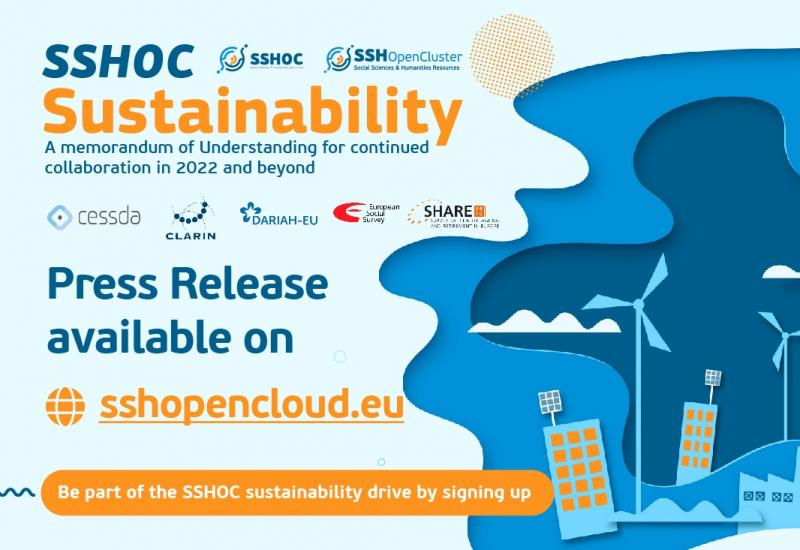
- Social Sciences & Humanities Open Cloud
SSHOC signs MOU to bolster cloud services for Social Science and Humanities

Date:
05 April 2022
New consortium signs Memorandum of Understanding to bolster cloud services for SSH practitioners and strengthen Europe’s social sciences and humanities open cloud ecosystem.
Europe’s open ecosystem for social sciences and humanities (SSH) has reached a key milestone after the Social Sciences Humanities Open Cloud (SSHOC) signed a Memorandum of Understanding with a group of organisations that will improve access to data, tools, and training for SSH practitioners.
Comprised of European Research Infrastructure Consortia (ERICs), this new entity called the ‘SSH Open Cluster’ will make it easier for researchers to collaborate across several SSH domains, promoting social sciences beyond industry professionals, end-users among the general public and key decision-makers in government.
The new cluster group will provide long term visibility, impact, and sustainability for SSH and its stakeholders by providing high quality ‘cloud ready’ SSH tools and data throughout Europe.
To improve research and innovation by making scientific discoveries Findable, Accessible, Interoperable, Reusable (FAIR), the SSH Open Cluster will work to remove the unnecessary duplication of results and costs involved in multiple organisations working on the same studies. By making research open access, these developments will lead to new insights and innovations, higher research productivity and improved reproducibility in science.
Ivana Ilijašić Veršić, CESSDA and SSHOC Coordinator said: "In SSH, multidisciplinary studies can only thrive if the researchers involved do not work in silos and if they can reuse each other's data rather than duplicate efforts. SSHOC has been instrumental in streamlining Europe's formerly fragmented landscape. The SSH partner organisations have built a closely interconnected network and played a crucial role in creating a sustainable model for the SSH Open Cluster. It ensures connections and collaboration to last beyond the project duration and a service offer for the sharing of resources that is aligned with EOSC. A big step towards cross-disciplinary research in SSH, and a much bigger potential for impact on a wider audience.”
The SSH Open Cluster will simplify high-level interactions with the EC and other EU bodies enabling effective responses to specific requests for expert advice in the areas covered by the member organisations.
Franciska Jong, Executive Director of CLARIN said: "The SSH Open Cluster will simplify collaboration for researchers by offering a single entry point to a service platform that supports the discovery of existing data, tools and expertise in the numerous and rich SSH repositories distributed across Europe and beyond. The partnership of the SSH infrastructures will contribute to the shaping of EOSC in terms of increased semantic and technical interoperability and help research communities explore new research frontiers.”
While the SSHOC was set up to study social and cultural phenomena and establish governance for the SSH part of the European Open Science Cloud (EOSC), this new SSH Open Cluster aims to go further. The new SSH Open Cluster will intensify collaboration between different SSH community stakeholders while actively promoting the quality and impact of SSH within the European Research communities and beyond.
The new body will coordinate activities towards key stakeholders, including EU institutions (Commission, Council, Parliament, Committee of the Regions), EOSC Association, ESFRI, national ministries, funding bodies, user communities, international partnerships, regulatory authorities, and industry.
SSH Open Cluster is comprised of a group of European Research Infrastructure Consortia (ERICs) that include: the Consortium of European Social Science Data Archives (CESSDA), Common Language Resources and Technology Infrastructure (CLARIN), Digital Research Infrastructure for the Arts and Humanities (DARIAH), European Social Survey (ESS), and Survey of Health, Ageing and Retirement in Europe (SHARE).
To find out more, please visit https://sshopencloud.eu/.
